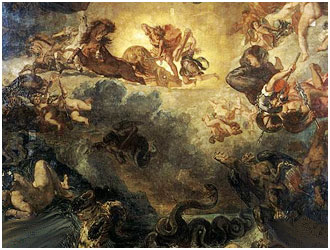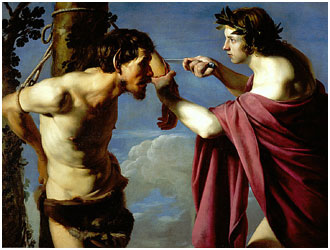Apollo, god of light and sun
 Apollo (Apollon) was known as a god of light and sun. He was also known as a god of music and poetry and as a leader of the choir of muses. Apollo was also credited to be prophetic, as the patron of the city of Delphi. The ancient Greeks have built him a temple on Mount Parnassus in Delphi after he slew the dragon which occupied the sacred shrine. He was even known as a master of healing and protector of the young. According to some sources, Apollo was also responsible for bringing plague and diseases to the lands. As the god of the sun, he represented the light time of a day in contrast to her sister Artemis who represented the night time. Apollo was also very loyal and friendly to his family as well as very creative and had a preference for music. But, on the other hand, he could also be selfish, arrogant and cruel, as it can be acknowledged in a myth of music contest with Marsyas and in a myth of Niobe and her children.
Apollo (Apollon) was known as a god of light and sun. He was also known as a god of music and poetry and as a leader of the choir of muses. Apollo was also credited to be prophetic, as the patron of the city of Delphi. The ancient Greeks have built him a temple on Mount Parnassus in Delphi after he slew the dragon which occupied the sacred shrine. He was even known as a master of healing and protector of the young. According to some sources, Apollo was also responsible for bringing plague and diseases to the lands. As the god of the sun, he represented the light time of a day in contrast to her sister Artemis who represented the night time. Apollo was also very loyal and friendly to his family as well as very creative and had a preference for music. But, on the other hand, he could also be selfish, arrogant and cruel, as it can be acknowledged in a myth of music contest with Marsyas and in a myth of Niobe and her children.
Usually, he was depicted as a young beardless handsome man with long healthy hair, holding a lyre in one hand and a branch of laurel in the other. Sometimes, he is depicted holding a bow and a quiver of arrows.
Avenging his mother
Apollo was a son of Zeus and titan goddess Leto and had a twin sister Artemis who is said to had helped at his birth. It happened on the island of Delos which was believed to be his mother's sister Asteria who had turned herself into an island to escape Zeus. It was the only place safe for Leto to give birth to Apollo and his sister Artemis, because she was relentlessly chased by Hera and her minions. In the next myth, Leto, after the birth of the twins, travelled to the Oracle of Delphi for guidance. During the trip, she was assaulted by a giant called Tityus who wanted to abduct her for his own pleasure. However, Apollo came to rescue and slain the monster on site with his archery expertise and a golden sword, with which he finished him off. Allegedly, several days after his birth, Apollo traveled to Delphi to avenge his mother for being pursued by Python, another minion of Hera. Succesful at killing Python, he also freed people of Delphi from being constantly harassed by this draconian monster that was sent by Gaea to occupy and protect the magical shrine. During creature's first expeditions, it pillaged houses and farms of the people living there and killed some of them in the process. But in a second attempt, the beast was intercepted by Apollo and slain on site with a single powerful shot from his bow. The god was also involved in the darkest of his myths. It all started when Niobe, the queen of Thebes, insulted the mother of the twins at the ceremony in honor of Leto, by bragging in front of everyone how blessed she was by having fourteen children and the goddess Leto only had two. Leto did not take this lightly and sent her children to slaughter all of Niobe's children. In matter of seconds Apollo killed seven sons with his arrows, while Artemis killed seven daughters, also with a bow and arrows. However, according to several sources at least one of her children was spared which Niobe took with her when she escaped to Mount Sypilus, where she turned to stone and formed a rock of continuous tears. Mount Sipylus, nowadays, indeed has a natural rock formation which resembles a female face and it has been associated with Niobe since ancient times.
Allegedly, several days after his birth, Apollo traveled to Delphi to avenge his mother for being pursued by Python, another minion of Hera. Succesful at killing Python, he also freed people of Delphi from being constantly harassed by this draconian monster that was sent by Gaea to occupy and protect the magical shrine. During creature's first expeditions, it pillaged houses and farms of the people living there and killed some of them in the process. But in a second attempt, the beast was intercepted by Apollo and slain on site with a single powerful shot from his bow. The god was also involved in the darkest of his myths. It all started when Niobe, the queen of Thebes, insulted the mother of the twins at the ceremony in honor of Leto, by bragging in front of everyone how blessed she was by having fourteen children and the goddess Leto only had two. Leto did not take this lightly and sent her children to slaughter all of Niobe's children. In matter of seconds Apollo killed seven sons with his arrows, while Artemis killed seven daughters, also with a bow and arrows. However, according to several sources at least one of her children was spared which Niobe took with her when she escaped to Mount Sypilus, where she turned to stone and formed a rock of continuous tears. Mount Sipylus, nowadays, indeed has a natural rock formation which resembles a female face and it has been associated with Niobe since ancient times.
Birth of Asclepius
Coronis was one of the lovers of Apollo and got pregnant with Asclepius. While he was away, she fell in love with a mortal and had an affair with him. However, this affair had not gone unnoticed. Apollo left behind a crow to watch over Coronis while he was away and the crow promptly informed him about this affair. Apollo was so outraged at crow, for not pecking her lover's eyes out upon approach to Coronis, that he casted a spell on it so fierce that it scorched its feathers and made the crow black instantly. He then sent Artemis to kill her but the goddess captured her instead and waited for her brother to come back and do it himself. Later, Coronis was put on a pyre at the funeral where Apollo finally felt sorrow and gave a hint to Hermes to save the child. Hermes then cut Asclepius from her mother's body while she was already aflame. And the child proved himself worthy of saving by becoming a grandmaster of healing. Asclepius eventually perfected his skills to the point where he defied Zeus. He was able to restore life from death and this was a crime against natural law and order, and thereafter Asclepius was destroyed by Zeus' thunderbolt and put among stars.
Music contest
Apollo was once challenged by a satyr called Marsyas who was the first to compose tunes for a flute. He got the instrument from Athena who invented it, but later abandoned it because she thought that the instrument was not precious enough for the gods. Anyway, Marsyas dared Apollo to a contest in hubristic pride over the new-found music. The rules were set that the winner could treat the loser in any way he wanted. In the first round, the satyr's music was equal to the god's tunes of lyre. Apollo was surprised and bit threatened by the performance of Marsyas and therefore demanded that the second round is played with the instrument turned upside down. The god was playing his song normally with his lyre, while Marsyas got stuck by his "one-sided" flute. After losing, Apollo had Marsyas tied to a tree and flayed him alive for his insolence. The rustic deities then, in their pity, transformed this poor creature into a mountain stream.
He got the instrument from Athena who invented it, but later abandoned it because she thought that the instrument was not precious enough for the gods. Anyway, Marsyas dared Apollo to a contest in hubristic pride over the new-found music. The rules were set that the winner could treat the loser in any way he wanted. In the first round, the satyr's music was equal to the god's tunes of lyre. Apollo was surprised and bit threatened by the performance of Marsyas and therefore demanded that the second round is played with the instrument turned upside down. The god was playing his song normally with his lyre, while Marsyas got stuck by his "one-sided" flute. After losing, Apollo had Marsyas tied to a tree and flayed him alive for his insolence. The rustic deities then, in their pity, transformed this poor creature into a mountain stream.
Trojan war
During the Trojan war, Apollo sided with Trojans mostly because Agamemnon had captured an ocean nymph called Chryseis who happened to be a daughter of one of the Apollo's priests. Therefore, the god shot an arrow infected with plague into the Greek encampment, spreading the disease among Greeks. Agamemnon then had no choice but to return Chryseis to the god, to prevent further wrath from the god. Apollo also helped Paris, a prince of Troy, in killing Achilles by presenting him the secret of his vulnerability. It is said the reason behind such decision was because Achilles killed one of his sons in the god's own temple.
Other myths
In a love myth, it is said that Apollo had chased a beautiful rustic nymph Daphne. She was his first love and the god wouldn't accept no for an answer. But Daphne was not interested in him and tried to flee. It was all in vain because he eventually caught her and forcefully embraced her with his arms. In despair, she prayed to her mother Gaea, asking her to make her disappear. Her request was granted and Daphne vanished into thin air. Well almost as on the spot, that she was seen for the last time, a sacred laurel tree grew. He was also involved in a myth where himself and west-wind god Zephyrus competed for the love of a young man, called Hyacinth. Wanting to impress Hyacinth, Apollo threw the discus with all of his force and accidentally killed the young man who wanted to catch it. Apollo also wrestled Heracles over the Delphic tripod, when Heracles stole it after not being satisfied with the answer of Pythia. All the gods joined to watch the battle, supporting their favourite. They had great entertainment until Zeus came and sentenced Heracles into one-year slavery.